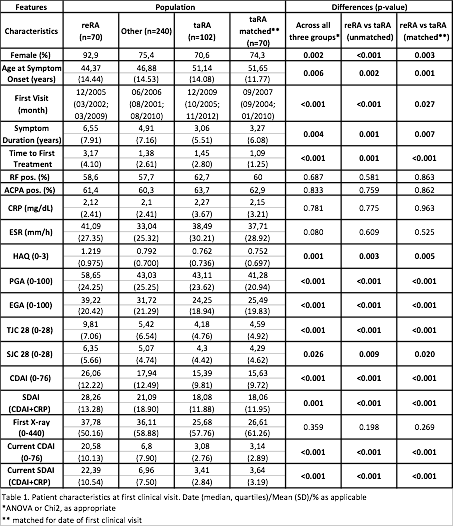Session Information
Date: Sunday, November 5, 2017
Title: Rheumatoid Arthritis – Clinical Aspects Poster I: Treatment Patterns and Response
Session Type: ACR Poster Session A
Session Time: 9:00AM-11:00AM
Background/Purpose:
It is an ongoing matter of research, whether the course of rheumatoid arthritis (RA) can be altered by an early intervention, a concept historically referred to as the window of opportunity. So far, only short-term disease outcomes have been investigated, which are, however, inherently affected by the unknown rate of underlying rate of self-limiting disease. It is unclear, whether the disease course is really affected by the timing of initial treatment.
Methods:
Patients were identified from a clinical database at the Medical University of Vienna. We used stringent criteria to define refractory RA (reRA): >=3 treatment courses (>=1 biological) over >=18 months since diagnosis without reaching low disease activity (LDA) or remission (REM) defined by a Clinical Disease Activity Index (CDAI, >=10). In contrast, we defined treatment amenable RA (taRA) as patients reaching LDA, or REM within the first 2 treatment courses.
We first matched patients with reRA and taRA 1:1 for time of inception in our database to avoid bias by secular trends in management over time. Using the reRA or taRA status as the dependent variable, we performed logistic regression analysis. Furthermore, we performed the same analyses in an unselected group of all-comers at baseline regarding their probability of developing reRA.
Results:
We identified 412 patients who had their last clinic visit at or after July 1st, 2016: 70 reRA and 102 taRA patients were identified; 240 patients fulfilled neither definition. In the reRA group, female gender was more frequent, age of disease onset lower, and CDAI higher at first presentation. Remarkably, the time to first DMARD treatment was significantly delayed between reRA and taRA (table 1).
In the matched multivariate model, treatment delay (p=0.047), female gender (p=0.038) and higher disease activity (p<0.001) were significant. In the logistic regression analysis of the 412 patients treatment delay was significant univariately (p<0.001) and after adjustment for other significant predictors (p=0.007; table 2). We then conducted a matrix model based on this analysis with predicted probabilities of developing reRA (figure).
Conclusion:
Our data suggest that delay to initial treatment affects the long-term course of RA. Earlier treatment initiation thus may change the severity of RA.
To cite this abstract in AMA style:
Bécède M, Alasti F, Haupt L, Hütter L, Kerschbaumer A, Landesmann U, Supp G, Smolen JS, Aletaha D. Time to First Treatment Is Associated with a Refractory Course of Rheumatoid Arthritis [abstract]. Arthritis Rheumatol. 2017; 69 (suppl 10). https://acrabstracts.org/abstract/time-to-first-treatment-is-associated-with-a-refractory-course-of-rheumatoid-arthritis/. Accessed .« Back to 2017 ACR/ARHP Annual Meeting
ACR Meeting Abstracts - https://acrabstracts.org/abstract/time-to-first-treatment-is-associated-with-a-refractory-course-of-rheumatoid-arthritis/



